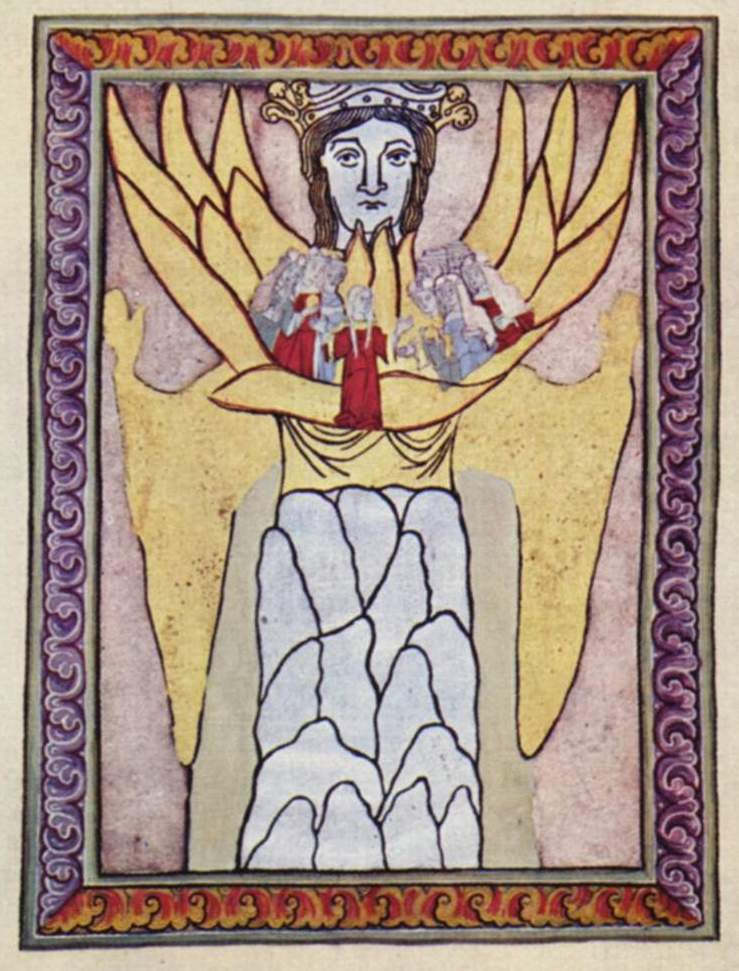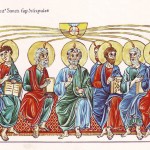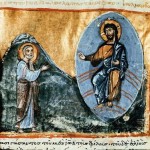
What It’s About: Wisdom! Proverbs is a lot about wisdom generally, but this part of Proverbs in particular focuses on Wisdom (personified, with a capital W) as a living, moving, constitutive part of God’s work and God’s world. Wisdom relates to the human world; she waits for humans in all their usual haunts, by gates and on roads, seeking their attention and inviting their fellowship. And Wisdom relates to the created world; here Wisdom (hokhmah, in Hebrew) is understood as a created being from the beginning of God’s creation, who has seen the world made. This created nature is important; Wisdom here isn’t a co-eternal aspect of the divine, but an important and early part of the created order.
What It’s Really About: Proverbs is part of the wisdom literature of the Hebrew Bible, and it’s connected to a whole tradition of wisdom and her children, in which various traditions coalesce around a particular way of viewing the divine. A lot of this tradition is attributed to Solomon, as is Proverbs particularly, although historically speaking there is good reason think of Proverbs as a collection of wisdom sayings from a variety of sources. The divine is imagined in a variety of ways in the Hebrew Bible (and the New Testament for that matter), and there is no one definitive way to describe God in scripture. But even within that diversity, wisdom literature stands out a bit for its playful, free, and distinct ways of describing God and God’s work. Wisdom is a way of talking about God’s ongoing interest in humans; it is a relational way of thinking about how God thinks about us. In that sense, Wisdom is very different from other metaphors (lord, king, warrior, storm, rock) that get used more frequently. Wisdom points to a godly interest in human thriving–a kind of divine humanism. God wants us to be better people!
What It’s Not About: This text is included here, on Trinity Sunday, because the Hebrew Bible’s Wisdom is often seen as one of the predecessors and prefigurements of the Holy Spirit of Christian scripture and theology. Sophia (the Greek word for Wisdom) is one of the ingredients that went into Christian thinking about the third member of the trinity, and so we read about Wisdom on Trinity Sunday. But this text is not a simple and innocent proof text for a Christian Holy Spirit; this text was one of many battlegrounds upon which Christians fought over the nature of the Trinity and even the nature of Jesus. One of the big early debates was about whether Jesus (and the Spirit) were co-eternal or created beings. The proto-orthodox claimed the former; many other Christians claimed the latter, and this text, with its clear references to Wisdom as a created being, was important in that conversation and debate.
Maybe You Should Think About: What is at stake when we talk about “Trinity?” What are we asking of God when we describe God as threefold? Proverbs seems to have no trouble describing Wisdom as an aspect of God’s work in and care for the world, but there also seems to be no impulse in Proverbs to make Wisdom one with God. Why do Christians do this? What’s behind the impulse to codify attributes of God?
What It’s About: The notes in my Harper-Collins NRSV call this a “transitional paragraph” between the opening of the letter and the dense theology of chapters 6-8, and that seems about right to me. These verses are clearly about grace, and they clearly relate to the way human beings stand before God. The familiar Pauline phrase “justified by faith” appears here, and it’s worth pausing to ask what those words might mean. Since the Protestant Reformation, many Protestants have claimed these words to stand in for the Reformation principle of sola fide, in which faith is the sole mechanism of our justification. But modern New Testament scholarship has identified faith (pistis) as an especially troublesome word in Paul’s thought, and scholars are now divided over what Paul meant by phrases like this one.
What It’s Really About: Whose faith justifies us? And in what sense are we justified by faith? Protestants have usually taken this phrase and others like in Paul’s writing and interpreted it to mean that the faith of a person, which mostly means their belief in Jesus in an intellectual-assent kind of way, is salvific. But increasingly scholars are understanding the Pauline emphasis on faith to refer most properly to the faith of Jesus, and Jesus’ faithfulness, as the saving work meant by Paul in this and other passages. If interpreted that way, then, these verses make a lot of sense. “Since we are justified by the faith (of Jesus),” Paul writes, “we have peace with God through our Lord Jesus Christ, through whom we have obtained access to this grace in which we stand.” The faith that justifies might be Jesus’ faith–his faithfulness to his calling and his task. While this shifts part of the content of Christianity away from individual intellectual assent, it serves to heighten the role of Jesus; Jesus’ life is a faithful witness that not only inspires us, but also makes our justification possible.
What It’s Not About: The problem with adopting the above interpretation, which I do adopt, is that then you have to contend with the collapse of 500 years of Reformation theology that has been piled on the foundation of sola fide. Faith-as-belief (and its counterpart not-works) have undergirded much of Protestant theology. In my opinion, this collapse should not be seen as a very great loss. Christian faith is impoverished when it is understood as a simple intellectual act, requiring Christians to believe in the existence of God and believe that Jesus is the savior, and do nothing else. I doubt very much that such a belief-based theology is what Paul had in mind; he certainly didn’t go around writing letters like Romans in the search for people to believe. He wanted them to believe, yes, but he also wanted a great deal more than that.
Maybe You Should Think About: If the notes in the Harper-Collins are correct, and this is a transitional paragraph that leads into chapters 6-8, then how does this paragraph set those up? What does Paul say here that tips off his argument later? How is he building on this material in his later chapters?
What It’s About: In this short saying from John, Jesus is promising the arrival of another instantiation of God’s presence, the “Spirit of truth,” which will speak in the future. It is implied, by not made explicit, that this Spirit of truth will come after Jesus has departed, as a way of continuing God’s revelation. Interestingly, this Spirit of truth doesn’t speak for itself, but seems to be a messenger or an intermediary. In John, this is how Jesus is described as speaking; Jesus speaks for the Father. So here we have a nebulous proto-trinity, with Jesus (who speaks for the Father, God) describing another being, the Spirit of truth, who also will speak for God. Christianity hadn’t developed a Trinity by the time John was written, but you can see the raw materials in passages like this.
What It’s Really About: This passage is connected in interesting ways to the Proverbs text above. Jesus doesn’t go into much detail about the Spirit of truth, but it seems to be roughly in the same vein as Wisdom. The Spirit of truth is a messenger and a provoker, an exhorter and an improver of humanity–in the same way that Wisdom is. John (and Jesus) probably didn’t have Proverbs in mind explicitly here, but Wisdom is in the background as a paradigm of this kind of divine activity.
What It’s Not About: This isn’t trinitarian. It’s a proto-trinity, in the sense that the later Christian Trinity was constructed out of passages like this one, but this is still well short of the full-blown trinitarian thought that developed later on in the Christian tradition. Some may even find this expression of trinitarian thought comforting; the Trinity as expressed in doctrine and dogma is threefold, and not twofold or fourfold, but Jesus here seems to be describing just one in a possibly large number of possible expressions of God. Wisdom is another. Jesus himself is another. There is a kind of freedom in noticing the many expressions of God’s presence without immediately categorizing them as one of the three parts of the Trinity.
Maybe You Should Think About: You might want to think about the purpose of a “Trinity Sunday.” Is it to reinforce a dogmatic position that you or your church has taken? Is it to celebrate the multiplicity of God? Is it to answer questions about what a “Trinity” is anyway? Different people and different congregations are at different places at different times; the kind of work you do on a day like this might vary from didactic to pastoral to celebratory to something else. The Trinity was a relative latecomer to Christian theology, and it remains a difficult concept for many, so think through how you want to approach it on the day of the year given over to it.
















